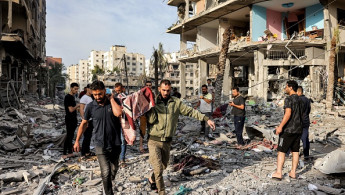UN puts Gaza humanitarian aid need at 100 trucks per day
Gaza, reeling under Israel's brutal bombing campaign, needs huge amounts of humanitarian aid, around 100 trucks per day, UN sources said Wednesday.
"We need to start with a serious number of trucks going in and we need to build up to 100 trucks a day," the UN's Emergency Relief Coordinator Martin Griffiths told CNN Europe.
"That used to be the case of the aid program going into Gaza," he added, even before the past two weeks of heightened unrest following the Hamas attack which killed some 1,400 people in Israel and the Israeli airstrikes which have left some 3,500 dead in Gaza.
"We've been in incredibly detailed negotiations with the parties to make an understanding and an agreement on exactly what an aid program would look like going into southern Gaza," said Griffiths.
"So number one, we need to be able to have the assurance that we can go in at scale every day, deliberately, repetitively and reliably," said Griffiths, speaking hours after US President Joe Biden said he had received Israeli assurances that aid would come in through the Rafah border crossing on the Gaza-Egypt border at the southern end of the Gaza Strip.
"Secondly, we have to be able to do so to reach people safely. International humanitarian law is there for a reason. It requires people to make their own choices about where to be safely, and it requires us and indeed, all of us to ensure that safety, and the humanitarian community to provide aid to people in the places they choose to be safe."
He said he hoped that within the next couple of days the "essential program of aid" could start, said Griffiths, noting the UN, including its Relief and Works Agency for Palestine Refugees (UNRWA) development agency, has some 14,000 staff in the strip to aid with distribution.
Taking also into account colleagues from the Red Crescent aid organisation, Griffiths, in Cairo negotiating with Egyptian authorities, said, "We have the resources to do this."
Tons of aid remain for the time being blocked in the Sinai desert with the Rafah crossing on the Palestinian side closed following four bombardments this week.
The office of Israeli Prime Minister Benjamin Netanyahu earlier said Israel would not prevent humanitarian aid coming in via Egypt in the form of food, water and medicine.
Griffiths stressed the aid would go to the civilian population and not to Hamas, which controls Gaza, home to 2.4 million people.





 Follow the Middle East's top stories in English at The New Arab on Google News
Follow the Middle East's top stories in English at The New Arab on Google News
![The UAE is widely suspected of arming the RSF militia [Getty]](/sites/default/files/styles/image_330x185/public/2024-11/GettyImages-472529908.jpg?h=69f2b9d0&itok=Yauw3YTG)
![Netanyahu furiously denounced the ICC [Getty]](/sites/default/files/styles/image_330x185/public/2024-11/GettyImages-2169352575.jpg?h=199d8c1f&itok=-vRiruf5)
![Both Hamas and the Palestinian Authority welcomed the ICC arrest warrants [Getty]](/sites/default/files/styles/image_330x185/public/2024-11/GettyImages-2178351173.jpg?h=199d8c1f&itok=TV858iVg)